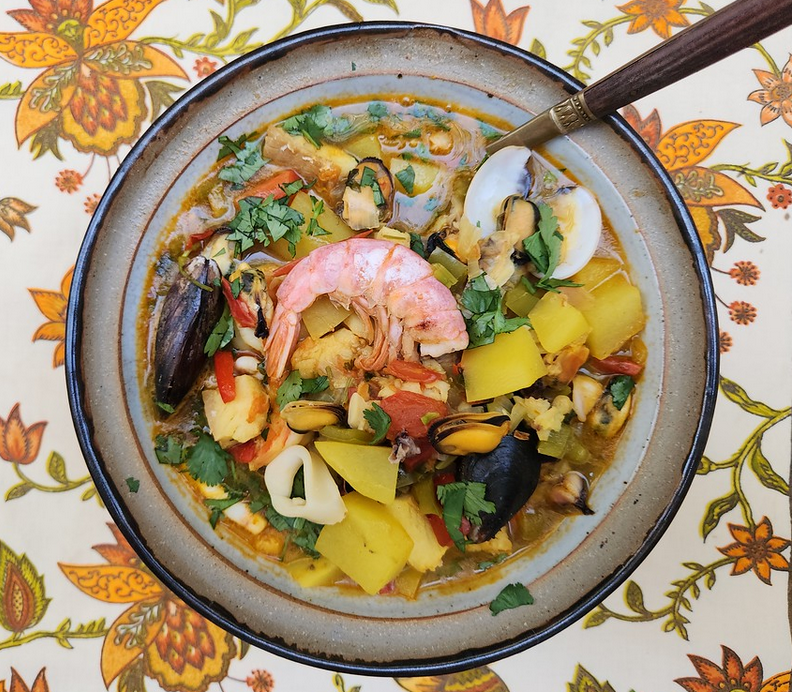
Doro Wat is considered the national dish of Ethiopia. It is a popular holiday food, as well as restaurant item, in Ethiopia. It is common to have 2 or more people communally share a single large plate.
What makes Doro Wat different than many other stews and curries is the process of sweating the onions for a very long time. This allows the onions to be used as a thickener for the stew. The spiciness of the Doro Wat comes from the Bebere spice mixture which uses Berbere peppers. Coming in at 30,000 on the Scoville Scale, just a bit hotter than a red seranno pepper. In this recipe we use ground cayenne chili powder.
A kosher version, Sanbat Wat (aka Sabbath Wat), substitutes vegetable oil for the Niter Kibbeh (a spiced version of ghee or clarified butter). If you substitute beef for the chicken it is called Sega Wat; all of the other ingredients remain the same.
Wat stews are typically served on top of ijera bread, which is similar to a thin spongy pancake. The tangy taste of injera, which is created through the fermentation of the batter, greatly compliments the spicy wat. You can shorten or forego the fermentation process, but the injera will be less flavorful. The injera doubles as a bread and eating utensil. Small pieces of injera are torn away to eat the stew which is piled in the center of the bread.
Injera is usually made from teff grain (and sometimes sorghum or barley). Teff, also known as Williams Lovegrass, is a very small grain, about the size of a poppy seed. It is gluten-free and some rave about its other health benefits. Teff is the largest cash crop in Ethiopia and most of the world's teff is grown and consumed in Ethiopia and Eritrea, where government policies seek to ensure that it's available to citizens. However, this grain is now also grown in Europe and the US.
In the United States, teff flour is often mixed with wheat flour, but in Ethiopia pure teff is the standard even though it is relatively expensive. Being able to make injera with pure, high-quality, preferably light-colored teff is generally the privilege of well-to-do households and a symbol of wealth.
If you want to make your own injira, it requires a few days to ferment as the bubbles are important to the texture of the resulting injera. If the teff doesn't ferment on its own, yeast can be substituted. The injera is cooked on a large circular griddle called a mitad, which is similar to a low-sided paella pan. If you have a crepe pan or a crepe maker, they would more than suffice. We used a cast iron frying pan, but a non-stick frying pan would be a better choice to avoid the bread sticking to the pan
Before You Get Started
Doro Wat with injera bread requires pre-planning, a good bit of time and a rather long list of ingredients. Thankfully most of the ingredients, with the exception of the teff flour and ghee, are readily available in most grocery stores.
Ghee can be purchased in an Indian grocery store and we bought teff flour through Amazon. If any of our readers know a local source for teff flour, please let us know and we will update the recipe with that info.
Ingredients:
This recipe calls for the preparation of 4 different parts:
- Niter Kibbeh (spiced butter)
- Berbere spice mix
- Injera Bread
- Doro Wat "stew"
For your convenience we have created a list of all the ingredients, but please note that some of ingredients are used in more than one preparation.
- 3 pounds chicken thighs, bone in or boneless
- 4 cups onions, finely chopped
- 4 hard-boiled eggs
- 4 cups water
- 5 cups teff flour
- 1/8 teaspoon active dry yeast
- 1/2 pound butter or ghee (ghee is preferred)
- 1 cup chicken stock
- 2 tablespoons lemon juice
- 4 cloves garlic, coarsely chopped
- 2 tablespoons fresh ginger, chopped
- 1 teaspoon whole allspice berries
- 1 teaspoon fenugreek seeds
- 1 teaspoon dried oregano
- 1/2 teaspoon ground turmeric
- 2 teaspoon coriander seeds
- 4 cloves
- 3 tablespoons cayenne chili powder
- 2 tablespoons paprika
- 3 tablespoons ground ginger
- 1/4 teaspoon garlic powder
- 1/3 teaspoon onion powder
- 1 pinch grated nutmeg
- 1/2 teaspoon ground cinnamon (or 1 stick)
- 1 teaspoons table salt
Preparation:
Niter Kibbeh (spiced butter) Ingredients:
- 1 pound butter or ghee (ghee is preferred)
- 1 tablespoon fresh ginger, chopped
- 1 teaspoon whole allspice berries
- 1 teaspoon fenugreek seeds
- 1 teaspoon dried oregano
- 1/2 teaspoon ground turmeric
- 2 cloves garlic, coarsely chopped
- 1 small yellow onion, finely chopped
- 2 teaspoon coriander seeds
- 4 cloves
Preparation:
- Melt butter in a saucepan
- Add all the ingredients above and cook on medium-low for approximately 1/2 hour. Be careful to not let the butter burn. It should be no hotter than 325° F.
- Strain the mixture with cheesecloth (in a strainer).
Berbere Ingredients:
- 3 tablespoons cayenne chili powder
- 2 tablespoons paprika
- 1 teaspoons ground ginger
- 1 teaspoons kosher salt
- 1/4 teaspoon garlic powder
- 1/3 teaspoon onion powder
- 1 pinch grated nutmeg
- 1/2 teaspoon ground cinnamon
Preparation:
- Thoroughly mix all the spices together.
Injera Ingredients:
- 1 cup teff flour
- 2 cups water
1/8 teaspoon of active dry yeast (if necessary) Injera Preparation:
- In a mixing bowl, mix 2 cups of water to 1 cup of teff flour.
- Cover mixing bowl and place in a warm place for 2-3 days to ferment. *
- After fermentation, stir teff batter thoroughly.
- Heat a large flat pan to medium heat. Note: it is highly recommended that you use a non-stick pan! If you own a crepe pan or crepe maker, use it.
- Lightly oil the pan with vegetable oil.
- Starting from the outside edge of the pan, spiral the batter inwards until the entire pan surface is covered.
- Cook until bubbles form over entire surface.
- Cover pan with a lid and cook an additional 3-4 minutes. Towards the end of cooking time, check to see that the surface is no longer wet.
- Working from the edges, use a large flexible spatula to remove injera bread from pan.
- Let the injera bread cool on a rack for a few minutes.
* Note: If after a day the batter does not seem to be fermenting, mix in 1/8 teaspoon of active dry yeast, re-cover and wait 2 more days.
Doro Wat Ingredients:
- 3 pounds chicken thighs
- 4 hard-boiled eggs
- 2 tablespoons lemon juice
- 2 tablespoons Niter Kibbeh
- 3 cups onions, finely chopped
- 1 tablespoon garlic, minced
- 1 tablespoon ginger, finely grated
- 1/2 cup Berbere spice
- 1 cup chicken stock
Preparation:
- In a bowl, marinate chicken with lemon and a teaspoon of salt. Let stand for 30 minutes.
- Hard boil 4 eggs.
- In a large skillet, sweat onions at a low heat, stirring frequently so as not to burn them (20 - 30 mins).
- Add garlic, ginger, salt, 3 tablespoons of spiced butter, all of the Berbere spice mix and cook for an additional 10 minutes.
- Add chicken to the broth and simmer for 45 minutes, stirring occasionally.
- Cut each egg in half and gently fold into the Doro Wat.
- Cook for an additional 5 minutes.
- Serve over injira bread
Recipe by T. Johnston-O'Neill
Photo by Shari K. Johnston-O'Neill








